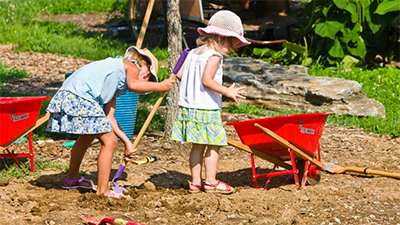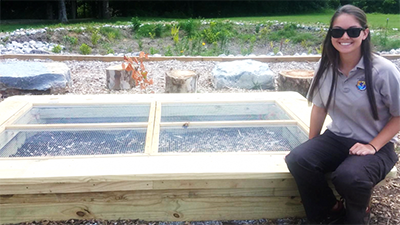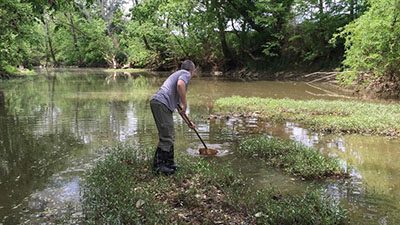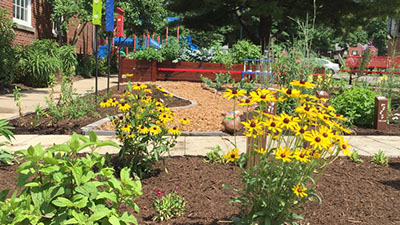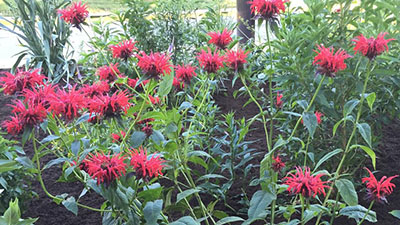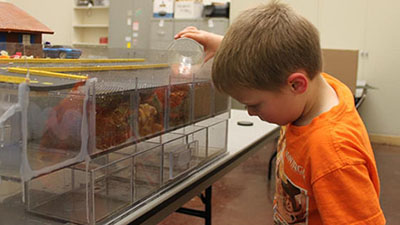STEM/Environmental Education
Environmental education seeks to create a society with the knowledge, experiences and critical thinking skills needed to make informed environmentally based decisions and the motivation to act upon those decisions. An informed resident can better evaluate the implications of their actions, and the actions of others, on the environment. A motivated resident is willing to change their actions and to encourage others to change their behaviors. Widespread behavioral change is critical for Kentucky, the nation and the world to realize the aforementioned improvements. Technological advances, alone, are not enough.
Through our extension program, we can assist schools and teachers by providing one-on-one assistance in the design, construction, maintenance and use of outdoor classrooms. We recognize that our teachers are extremely busy and oftentimes need assistance in developing outdoor classrooms, particularly if these classrooms have multiple components such as rain gardens and rainwater harvesting systems. Another challenge that teachers face is how to use outdoor classrooms to deliver their lessons. As a Kentucky Association for Environmental Education approved facilitator in Projects Learning Tree, WET, Wild, Underground and Leopold, we help with these linkages.
Download the STEM/Environment Education Logic Model
Outdoor Classrooms
We are taking the indoors out by creating interactive outdoor learning environments.
Outdoor classrooms are spaces where students can learn about the natural or human-created world while in an outdoor or natural setting. An outdoor classroom can be as simple as a stream, woods or a patch of soil, but often involves a space with a carefully planned layout, much like that of an indoor classroom. Outdoor classrooms encourage exploration and allow instructors to engage learners in interdisciplinary, hands-on lessons.
Read More about Taking the Indoors Out
Wolf Creek National Fish Hatchery Rain Garden
Wolf Creek National Fish Hatchery in Jamestown, KY, provides a variety of education programs. To complement the programs, staff desired a rain garden near the Visitor/Environmental Education Center. The semi-circular rain garden captures runoff from the raceways, parking lot and roads. The rain garden contains an elevated learning area and a walking path. Volunteers planted the rain garden with native plants suitable for pollinators such as butterflies and bees. Native grasses were seeded along the outside of the rain garden. Staff recently added an outdoor turtle exhibit with plans for a raised bed garden.
View Photos of the Wolf Creek Rain Garden
Watershed Academies
Watershed Academies are three-day workshops designed to help communities learn about factors that affect the health of their local streams and watersheds. Workshops are hands-on with field activities and tours of nearby restored sites. Through these workshops, participants learn how to identify funding opportunities and partnerships to assist them in their efforts to improve their watersheds.
View Photos from Our Academies
Cassidy Elementary Science Garden
Cassidy Elementary constructed a multifaceted outdoor classroom (e.g. butterfly garden, rain garden, benches, composting, vermicomposting and demonstration rainwater harvesting) for engaging learners in Common Core curriculum. The science garden was constructed in cooperation with the Biosystems and Agricultural Engineering Department at the University of Kentucky under the supervision of Dr. Carmen Agouridis. The accessibility of the outdoor classroom meets the needs of every student. The area includes handicap-accessible raised bed gardens, butterfly habitats, a rain garden, sensory, herb and literature gardens, and a Kentucky native species area. It includes a seating area, rain barrel, compost pile, vermiculture and insect exploratory region.
View Photos of the Science Garden
Butterfly Gardens
A butterfly garden is a flowering garden designed to attract butterflies. Such gardens contain nectar plants, which provide food for the butterflies, and host plants on which the butterflies lay their eggs. Butterfly gardens require approximately six hours of sun per day. Not only are butterflies beautiful, but they are pollinators. The U.S. Department of Agriculture’s Natural Resources Conservation Service (USDA-NRCS) states that pollinators such as butterflies, bees and bats are responsible for supporting about 35% of the world’s food crops.
Learn More about UK's Butterfly Gardens
Stormwater Detectives
Kentucky served as one of the lead states in the development of the Next Generation Science Standards (NGSS). The NGSS serves as an update to the previously used state science standards; now engineering design is included. However, K-12 teachers often lack curriculum to teach engineering design. Both needs – the need for stormwater education and the need for K-12 engineering design based curriculum – created an ideal situation for a pairing. To fulfill this need, an interactive lot-scale stormwater model and five lesson plans were developed to teach primarily 3rd-5th graders about stormwater issues and how to define, design and test possible stormwater management solutions.
